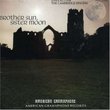| All Artists: Darius Milhaud, Ronald Corp, New London Orchestra, Jack Gibbons Title: Milhaud: Le carnaval d'Aix; Le carnaval de Londres; L'apothéose de Molière; Le b?uf sur le toit Members Wishing: 1 Total Copies: 0 Label: Hyperion UK Release Date: 8/10/2004 Album Type: Import Genre: Classical Styles: Ballets & Dances, Ballets, Forms & Genres, Concertos, Historical Periods, Modern, 20th, & 21st Century, Instruments, Keyboard, Symphonies Number of Discs: 1 SwapaCD Credits: 1 UPC: 034571151687 |
Search - Darius Milhaud, Ronald Corp, New London Orchestra :: Milhaud: Le carnaval d'Aix; Le carnaval de Londres; L'apothéose de Molière; Le b?uf sur le toit
 | Darius Milhaud, Ronald Corp, New London Orchestra Milhaud: Le carnaval d'Aix; Le carnaval de Londres; L'apothéose de Molière; Le b?uf sur le toit Genre: Classical |
CD DetailsSimilarly Requested CDs
|
CD ReviewsColorful Music Beautifully Performed D. A Wend | Buffalo Grove, IL USA | 08/16/2007 (5 out of 5 stars) "This excellent collection of music by Darius Milhaud was issued for his centenary in 1992 and has some familiar and some not so familiar music. Le boeuf sur le toit (composed in 1917) is perhaps the composers most famous work and is a collection of melodies, tangos, sambas etc. that Milhaud heard while secretary to Paul Claudel, the Ambassador to Brazil. At one time Milhaud thought Le boeuf sur le toit might be good music for a Charlie Chaplin film but Jean Cocteau, instead, turned it into a ballet. The ballet was a scandalous success and made Milhaud in demand. This performance has plenty of Gallic charm and wit.
Darius Milhaud was a performer as well as a composer and Le carnival d'Aix (1926) was written with a piano part for the composer. The music was reworked from an earlier ballet named Salade (from 1924) and is a colorful work in twelve sections some of which are based on dance melodies, such as polka and tango; it is a captivating work; the piano part is nicely played by Jack Gibbons with all the spontaneity demanded by the composer. L'apotheose de Moliere was a work that I was unfamiliar with; it is a short suite for small orchestra and harpsichord based on music by Baptiste Anet. The suite was written in 1948, commissioned by Italian Radio. It is an elegant and charming work that I would not suspect such a neo-classical work by Milhaud but it possesses the Gallic charm of the composer. This kind of music is not Milhaud's forte and does not come up to similar works by Stravinsky but the music has an appeal for me. The carnival de Londres from 1937 was also unfamiliar. The melodies used in this work come from an adaptation of John Gay's The Beggar's Opera that Milhaud had prepared for Radio Marseille. It is a light-hearted and charming work, consisting of 26 brief sections, containing music with Milhaud's usual wit and charm. The New London Orchestra under Ronald Corp turns in a fantastic performance and the booklet by Robert Matthew-Walker provides an excellent look at Darius Milhaud's orchestral music. The music is beautifully recorded and at the re-issue price is a disc " |









![Across The Universe [Deluxe Edition]](https://nationalbookswap.com/cd//m/51/1251/1241251.jpg)
